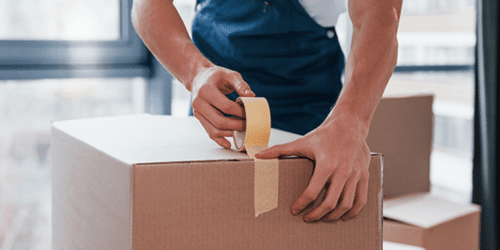The career path for a labeler falls under the larger field of Packaging and Filling Machine Operators and tenders. This is a job that generally involves working with industrial and consumer goods. As a labeler, your job is to run and take care of machines, get goods ready for delivery and storage, move and handle materials to keep the workflow going smoothly and check equipment to make sure it works safely. Labelers also operate or maintain machinery to get industrial or consumer goods ready for shipping or storage. Read on to find out why this might be a rewarding career path for you, including the job description, what they do, and how you can become one.
What is a Labeler?
A Labeler is an employee of a warehouse or distribution center whose job it is to apply labels to materials and goods. The responsibilities of a professional labeler usually include things like packing materials according to orders, labeling items accurately, writing tickets for finished products, printing stickers that need to be put on boxes, checking to make sure all stickers and labels are appropriately fixed, and handling machinery that produces paper products for labeling.
In addition to supporting all product and package labels at the production facility, the labeler plays a crucial role in post-production by supervising and coordinating all label serialization activities. This person is very methodical and has the ability to organize and carry out complex tasks.
What Does a Labeler Do?
A labeler’s main duty is to affix labels to goods or packages that are ready for shipment. This basically involves working with industrial and consumer goods. As a labeler, your job involves operating and maintaining machinery, packing products for shipment and storage, rearranging workspaces and transporting things as needed, and doing safety checks on machinery. You also talk to your coworkers and higher-ups to get the information you need to do your job. Mechanical aptitude, numeracy, a keen eye for detail, and teamwork aptitude are all very desirable in this position. While only a high school certificate is required to work as a labeler, there are programs available to teach you how to operate heavy gear if you want to develop your profession and obtain more experience.
Labeler Responsibilities:
- Take the finished packages out of the machine and sort the ones that are not good to go.
- Attach identification stickers or labels to those finished packages or cut stencils and stencil information on containers, such as lot numbers or shipping destinations.
- Check for broken goods and packaging and get rid of them.
- Stock and sort products for packaging or filling machines, and restock packaging materials like wrapping paper, plastic sheets, boxes, cartons, glue, ink, or labels.
- Stack items that are already packed or wrap each one in protective material, then put the items in cartons or containers.
- Stop or reset machines that aren’t working right, clear machine jams, and tell a boss about machines that aren’t working right.
- Watch how the machine works to make sure that the products that are filled or wrapped are of good quality and meet standards.
- Use the buttons to turn on the machine.
- The product is put into the form it will be sent out in. For example, flour is put into bags through a tube or spout.
- Count and write down the number of finished and rejected things.
- To get raw goods ready for processing, you need to clean them and get rid of any broken or otherwise bad parts.
- To get ready to pack products, clean the containers, line and pad the boxes, or put together the cartons.
- Sort, grade, weigh, and inspect goods, making sure they meet specifications for weight or measurement.
- Clean and oil machinery and equipment and make small changes or repairs, like opening valves or setting guides.
- Watch the production line for problems, like stack-ups, jams, or glue that doesn’t stick right.
Read Also: PRIVATE LABEL MANUFACTURERS: How To Find Them
Labeler Job Description
At company X, we are seeking a labeler to join our team to make sure that goods are labeled and shipped quickly and safely
Additionally, labelers must be able to weigh, label, and seal every container, use hand tools and adhesives to safeguard the shipment during transit and adhere to all workplace safety policies.
You will also make sure that all labels on packages that are being sent out are in place and that there are enough corrugated boxes for production.
In the end, you’ll operate in a fast-paced atmosphere and be in charge of making sure that the goods we ship to our customers arrive safely and accurately.
Labelers Responsibilities
- Makes sure that labels are attached to the outside of the product package correctly.
- Makes sure all labels are attached to product packages properly.
- Ensuring there are enough folded cardboard boxes for the day’s work.
- Stacks folded boxes on a cart so they can be taken to the assembly line.
- Follow all of the company’s rules about packing.
- Find broken things and get rid of them.
- Use packing materials like hand tools, glue, nails, padding, etc. in the right way.
- Keep full records of everything that comes in and out of the building.
- Keep your work area clean.
- Other jobs as they are given
Labelers Qualifications
- A high school diploma will be helpful, but it’s not necessary.
- Proven experience in manufacturing or a related area.
- A background in production is helpful, but not necessary.
- Basic skills for a shop, like how to use hand tools,
- Ability to follow verbal and written instructions
- Strong communication skills and a willingness to work with others
- Ability to stay in one place for a long time, stand up often, and do light to moderate lifting.
- Able to use a label printer and jig to get labels in the right place.
Essential Label Skills
Most labelers use their knowledge of “pallets,” “safety regulations,” and “assembly lines” to do their work. You can find more information about the most important job skills of a labeler below:
#1. Writing Skills
Labelers do a lot of work that depends on their “writing skills.” You can see how important it is to labeler responsibilities because “strong writing skills are useful for labeling, making instructions on products while also emailing responses for employers and customers. In addition, they use their writing skills to write and keep records of everything that comes in and goes out of the warehouse or facility.
#2. Listening Skills
One of the most important skills for a labeler to have in order to do their job is the ability to listen. As a support vessel between a manufacturer and consumers, labelers must be able to understand the problems that their customers are telling them about and know when to ask questions to get more information, Labelers use their listening skills every day. They listen to employees and guide them on how to use different pieces of factory equipment as they communicate and demonstrate company quality standards and procedures.”
#3. Problem-Solving Skills
Problem-solving skills are another soft skill that a labeler must have in order to do their job well. They must be able to identify both simple and complex problems, analyze them, and solve them. They make use of their ability to detect problems to determine which products are ready for shipment and discard those that are not.
#4. Strong Communication Skills
Communication skills are another skill that labelers need to do their jobs well. This skill is important for many of a labeler’s daily tasks because they need to communicate with coworkers and explain how to fix problems in a way that a non-technical person can understand. A labeler generally works hand in hand with other production workers from top to bottom, including the delivery sector. They get information about how products are to be processed, managed, and delivered and must make it a two-way thing.
#5. Customer-Service Skills.
Customer service skills are another common skill that can labelers need to have. Labelers use this skill all the time in their jobs.
How to Become a Labeler
To get a job as a labeler, you need to have a high school education and at least a few months of experience working in a warehouse. Many people who want this job start out in another role in the warehouse so they can learn more about how they package things. But employers may accept applicants who are otherwise qualified but have no experience in the field.
Regardless, if you want to work in a warehouse for the rest of your life, you might want to learn how to be a boss and ask your company what they look for in applicants for other jobs. For this job, you may need to use a phone or computer while labeling packages or goods correctly.
What Do You Call a Machine That Makes Labels?
A label printer is a type of computer printer that can print on self-sticking labels and/or tags made of card stock. A label maker is a label printer that has its own keyboard and screen and doesn’t need to be hooked up to a different computer.
What Does a Labeling Coordinator Do?
The Label Coordinator’s job is to make labels for products and shipping depending on when customers want them to be delivered. In addition, they make sure that they work and follow the label specs in accordance with how customers want them. The Label Coordinator is also in charge of different administrative tasks as demanded.
What Makes a Good Labeler?
Generally, in this role, you’ll frequently work with both commercial and domestic goods. As a labeler, your responsibilities include operating and maintaining machinery, organizing products for shipment and storage, relocating and organizing resources to facilitate a steady stream of work, and checking the condition of machinery to prevent accidents.
Conclusion
Labelers serve an essential role as one of the final quality control checkpoints between the consumer and the manufacturer. They have to make sure everything is in good functioning order. Any defective products must be disposed of in accordance with corporate policies.
Labelers pack finished goods into shipping containers, then weigh, label, and record data about each box before sending them off. The next step is to make sure the finished goods are delivered to the correct destinations, such as loading zones or inventory. While labeler must complete their work completely, the key is paying close attention to the details.
Related Articles
- PRIVATE LABEL PRODUCTS: 17+ Best Private Label Products to Sell in 2023
- HOW TO START A RECORD LABEL: How to Start a Record Label Company 2023
- PRODUCT LABELING: What Is It & Why Is It Important?
- What You Will Need When You Start Running Your Own Online Business






